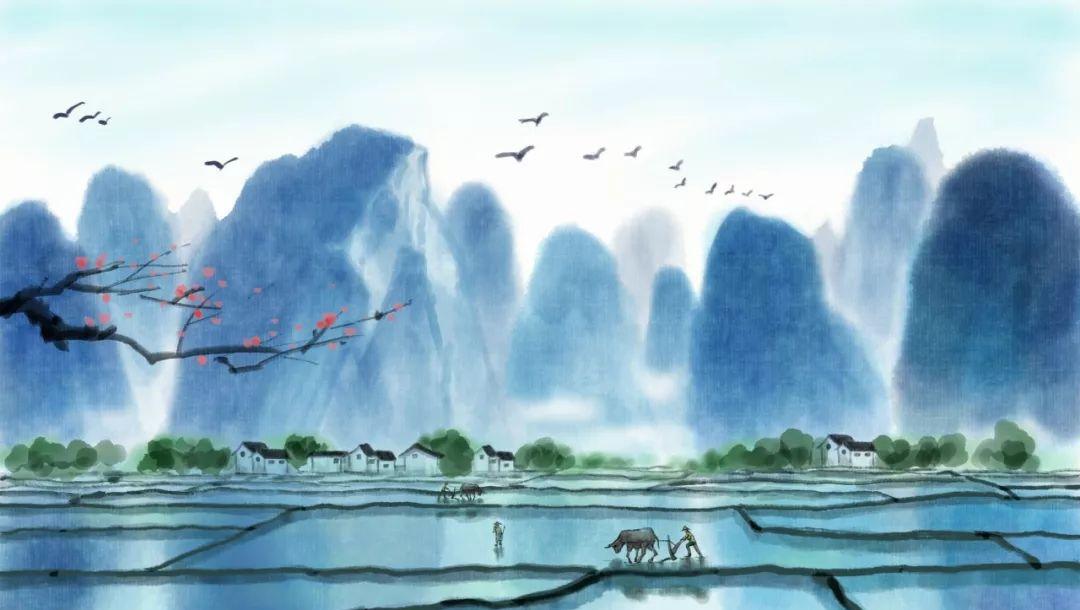In the TV series "Huan Zhu Ge Ge 1", Ziwei cooked in the suburbs, using verses to name the dish, among them, there is a poem, fresh and clear, like poetry, so that I was a teenager at that time has been remembering, this poem, on Wang Wei's "desert paddy field flying egret".
This poem is from Wang Wei's "Jiyu Yuanchuan Zhuangzuo", "Desert paddy field flying egret, yin yin summer wood yellow oriole" is one of the famous sentences, but, you know? In the Tang Dynasty, someone reported Wang Wei: This poem is plagiarized, what is the matter?

Let's look at this poem first.
"The Accumulation of Rain and the River"
The rain and the forest fireworks are late, and the steamed quinoa cooks and cooks the east.
Desert paddy field flying egret, yin yin summer wood yellow oriole.
Yamanaka learns to meditate on the hibiscus, and Matsushita Kiyosai folds the dew aoi.
The wild old man and the people quarreled, and the seagulls were even more suspicious of what happened.
Yuanchuanzhuang is Wang Wei's residence in Zhongnan Mountain, and Wang Wei lived here in his later years, writing many masterpieces that have been passed down to future generations.
This summer, after a long period of rain and early sunshine, Wang Wei wrote this poetic and picturesque work.
Cain Niang tried to translate the poem.
In the summer sky forest, because of the long rain, it is difficult to ignite the fire, and when the rain clouds are low, the cooking smoke slowly rises. When the peasant woman has prepared the meal, it will be delivered to the busy farmer in the field.
On the vast paddy field, egrets flew up, and in the dense woods, the yellow orioles sang gently.
I am used to the quiet life in the mountains, get up early to see the hibiscus blossom and fall, under the pine trees, after eating vegetarian food, I fold down the dewy green sunflower.
My old man in the field and the countryside has no quarrel with anything, so why should the seagulls suspect that I have bad intentions?
The poem depicts the beautiful and busy scene on the Guanzhong Plain after the summer rains have stopped, the first four sentences write the poet's contemplation and see, and the last four sentences write the poet's secluded life.
The poet combines his elegant and light Zen life with the idyllic and beautiful idyllic scenery of the River, creating an artistic conception in which things and I are confused and the scenes are blended.
The whole poem is vivid and sincere, and the atmosphere of life is strong, just like a light and elegant ink painting, fresh and clear, the image is clear, showing the poet's leisure and leisure in the mountains and forests and out of the world.
Later generations praised this poem "The Work of Jiyu Chuanzhuang", and hengtang retired soldiers selected it into the "Three Hundred Poems of Tang Dynasty". Some people push it as the pressed scroll of the Seven Laws of the Tang Dynasty, saying that it is the extreme of "empty ancient and quasi-modern", and praise this poem as "light and elegant and lonely", which shows the level of this poem.
Since ancient and modern times, many people have envied Wang Wei's secluded life in his later years.
In this poem, "Desert paddy field flying egret, yin yin summer wood yellow oriole" is a famous sentence sung through the ages.
"Batch Point Tang Poetry Zhengsheng": "Paddy field flying egret, Xia Mu Huang Li", everyone can do it, compared to the four words of "desert" and "yin yin", poetry wins.
However, in the Tang Dynasty, some people said that this poem was "plagiarized", what is going on?
Originally, when the Tang Dynasty scholar Li Zhao, seeing that Li Jiayou had a collection of poems such as "Flying Egrets in the Paddy Fields, Yellow Orioles in Xia Mu", he ridiculed Wang Wei for "good articles and Jia Sentences" (on the volume of the Supplement to the History of the State).
Meaning: Unexpectedly, you Wang Wei also like to copy other people's good verses!
Hu Yinglin, a Ming Dynasty man, defended Wang Wei: Wang Wei was a poet of the Sheng Tang Dynasty, while Li Jiayou was a poet of the Middle Tang Dynasty, how could the predecessors steal the poems of the descendants?
In fact, this point is untenable, because Li Jiayou and Wang Wei are almost contemporaries, and it is really impossible to say who copied whom?
However, the Song Dynasty poet Ye Mengde believed that the two overlapping words added by Wang Wei made the poem more exciting. "Desert" has a broad meaning, "yin yin" has a deep meaning, "desert paddy field" and "yin yin summer wood" compared to "paddy field" and "summer wood", the picture appears open and deep, rich in a sense of realm, rendering the cloudy and confused tone and atmosphere of the rainy weather.
Yin Niang feels that when the words "desert" and "yin yin" are read, there is a sense of music and beauty that is depressed and frustrated, and the poems often collide or borrow, and they will borrow well, which is the real skill!